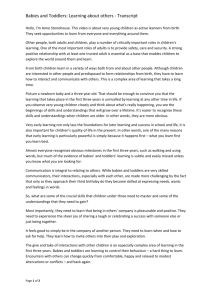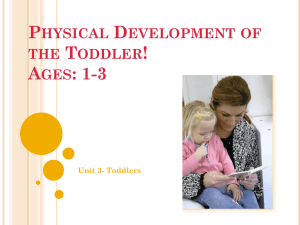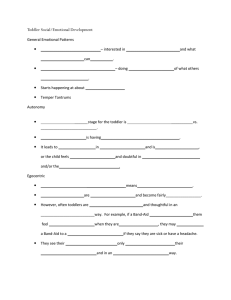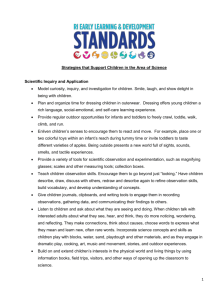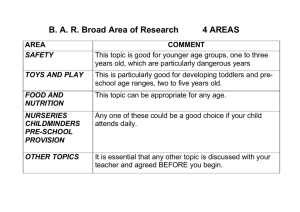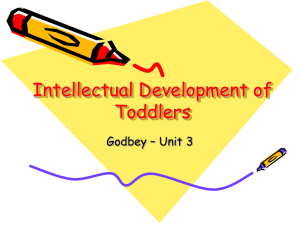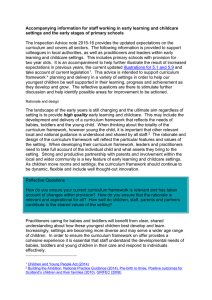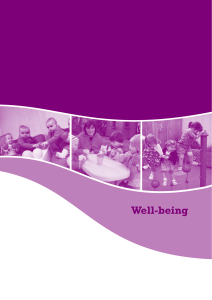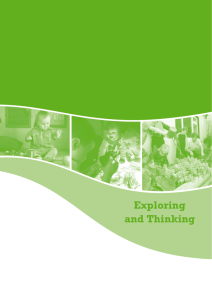Babies and Toddlers: Learning about me
advertisement
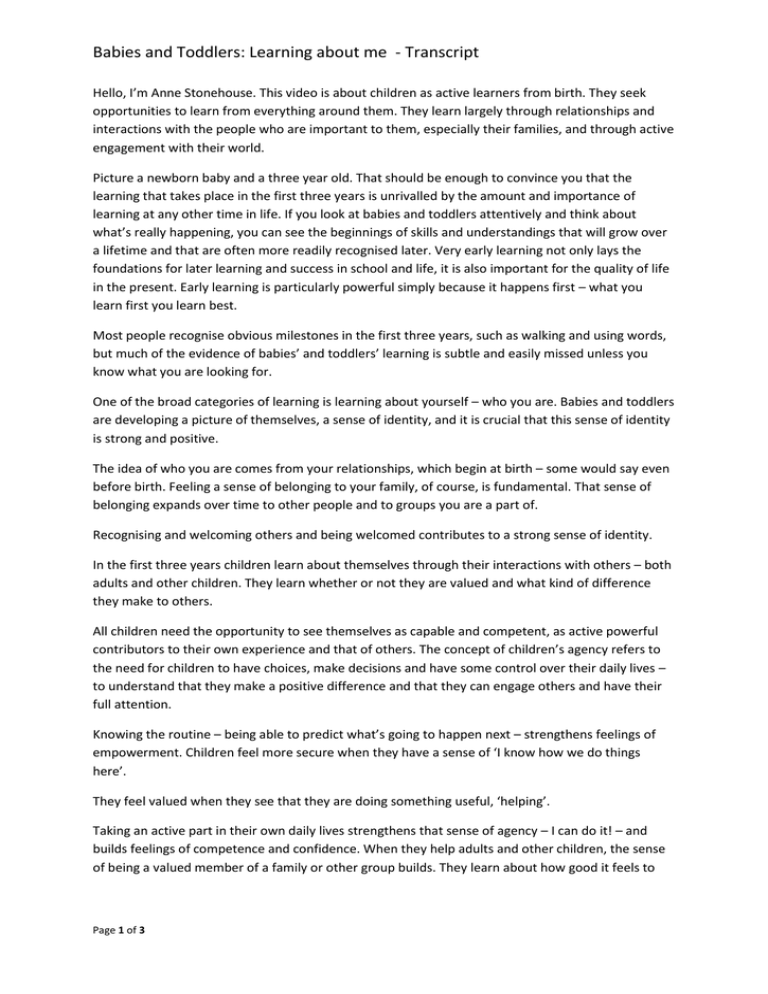
Babies and Toddlers: Learning about me - Transcript Hello, I’m Anne Stonehouse. This video is about children as active learners from birth. They seek opportunities to learn from everything around them. They learn largely through relationships and interactions with the people who are important to them, especially their families, and through active engagement with their world. Picture a newborn baby and a three year old. That should be enough to convince you that the learning that takes place in the first three years is unrivalled by the amount and importance of learning at any other time in life. If you look at babies and toddlers attentively and think about what’s really happening, you can see the beginnings of skills and understandings that will grow over a lifetime and that are often more readily recognised later. Very early learning not only lays the foundations for later learning and success in school and life, it is also important for the quality of life in the present. Early learning is particularly powerful simply because it happens first – what you learn first you learn best. Most people recognise obvious milestones in the first three years, such as walking and using words, but much of the evidence of babies’ and toddlers’ learning is subtle and easily missed unless you know what you are looking for. One of the broad categories of learning is learning about yourself – who you are. Babies and toddlers are developing a picture of themselves, a sense of identity, and it is crucial that this sense of identity is strong and positive. The idea of who you are comes from your relationships, which begin at birth – some would say even before birth. Feeling a sense of belonging to your family, of course, is fundamental. That sense of belonging expands over time to other people and to groups you are a part of. Recognising and welcoming others and being welcomed contributes to a strong sense of identity. In the first three years children learn about themselves through their interactions with others – both adults and other children. They learn whether or not they are valued and what kind of difference they make to others. All children need the opportunity to see themselves as capable and competent, as active powerful contributors to their own experience and that of others. The concept of children’s agency refers to the need for children to have choices, make decisions and have some control over their daily lives – to understand that they make a positive difference and that they can engage others and have their full attention. Knowing the routine – being able to predict what’s going to happen next – strengthens feelings of empowerment. Children feel more secure when they have a sense of ‘I know how we do things here’. They feel valued when they see that they are doing something useful, ‘helping’. Taking an active part in their own daily lives strengthens that sense of agency – I can do it! – and builds feelings of competence and confidence. When they help adults and other children, the sense of being a valued member of a family or other group builds. They learn about how good it feels to Page 1 of 3 Babies and Toddlers: Learning about me - Transcript achieve and to contribute. This learning is the beginning of learning how to be a citizen, a community member. Babies and toddlers take some small steps towards autonomy and independence, and begin to do things for themselves. They start learning how to look after their health and wellbeing. Through these actions they learn ‘habits’, or ways of going about their daily lives, that are likely to be long lasting. With babies and toddlers, many of the learning opportunities arise in daily living experiences, as they get ready to rest and sleep, wash their hands, serve food, pour their drinks, eat, put on and take off shoes and socks, help to set up and tidy up. The physical environment can support a sense of agency. In other words, it’s important for children to find their own opportunities to learn what they can do. Children in this setting sleep on mats on the floor, which allows them to decide themselves when they want to get up. Children also learn to manage frustration, and learn when and how to get help. Knowing that help and support are available is an important contributor to a strong sense of identity. Succeeding, meeting a challenge, is a cause for celebration, and it’s especially good if there’s someone to share it with. Babies and toddlers are great communicators, even before they are able to use language fluently. They learn to communicate and express themselves in a variety of ways – with gestures, facial expressions, through crying and with sounds and eventually words. Demonstrating that they understand language and the growing ability to communicate in words is one of the most dramatic and significant changes that occurs in the first three years. Babies and toddlers also communicate and express themselves through imitative, creative or pretend play. Learning to coordinate and control the body is a very important and prominent area of learning in the first three years. Children under three years spend a lot of time learning new skills and practising skills already mastered. Just moving through space – cruising – and moving objects around because you can, are massive steps forward in strengthening that sense of agency and making a difference. Simply walking over uneven surfaces or turning a corner is a challenge. You have to learn how to pick up an object off the ground without losing your balance – that’s not easy. Learning to use hands and fingers in ever-increasingly complex ways promotes independence, exploration and experimentation. When they have exposure to various kinds of tools, children initially explore them and then move on to using them for a purpose. Page 2 of 3 Babies and Toddlers: Learning about me - Transcript When they use paintbrushes and pencils they are learning basic skills that much later will allow them to draw, paint pictures and write. Learning to control your behaviour – being able to stop yourself from doing something you want to do – is challenging. In fact it’s not only children who struggle with self-control. Learning self-control involves learning how to express strong feelings as well as learning to go along and cooperate with something you don’t want to do at times. Sometimes you can persuade people and sometimes you can’t. Identity includes learning about your own and others’ rights and responsibilities and learning to assert yourself appropriately. This is a very complex area of learning. Many adults struggle with learning to respect and care for others, and also standing up for themselves. When you’re very young it’s not always easy to know what the rules are, and even more challenging at times to go along with them. Learning to express your needs and wishes and finding out that others will take them into account strengthens the sense of self. An experience that reveals differences in children’s styles, their sense of belonging and their resilience is how they make the transition between being with their family and being somewhere else with other people. Arrivals at the education and care service show that each child has ways of approaching this situation. Separating from the people you’re closest to is not always easy. As children’s understanding of their experience grows during the first three years, their reactions to separating change, and they need help at times to cope. This is perfectly normal and to be expected. The sense of being a member of a community, of belonging there, begins in infancy. To conclude, developing a strong sense of identity or sense of self is a lifelong endeavour. What is best for children is that they have a range of experiences in the first three years that teach them to be strong, confident and curious, and adults who appreciate the challenges that accompany learning about yourself. The following vignette captures a child who is well on the way to learning these things. Page 3 of 3

